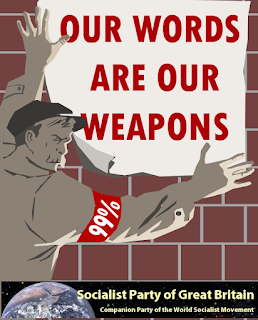“For our party, and for our party tactics, there is but one valid basis: the basis of the class struggle, out of which the Socialist Party has sprung up, and out of which alone it can draw the necessary strength to bid defiance to every storm and to all its enemies. . . . We may not do as other parties, because we are not like the others. We are—and this cannot be too often repeated—separated from all other parties by an insurmountable barrier, a barrier that any individual can easily surmount; but once on the other side of it, and he is no Socialist. . . . Just in this fact lies our strength, that we are not like the others, and that we are not only not like the others, and that we are not simply different from the others, but that we are their deadly enemy, who have sworn to storm the Bastille of Capitalism, whose defenders all those others are. Therefore we are only strong when we are alone.” - Wilhelm Liebknecht
The influence of socialist ideas among working people is weaker than it has been at any time before. it has not recovered from the damage done by the experience of the Soviet Union and the Labour Party. The struggle is to win the workers to a socialist point of view, as against the efforts of the capitalist media to keep the workers mentally bound to capitalism. Socialism is, without exception, the greatest revolutionary idea which has ever fired the imagination or enthused the heart of mankind
The working people are made up of those whose political and economic vision varies very considerably. Very many remain blind to the realities of the capitalist system and do not understand that they are wage-slaves to those who own the means of life of society Nor do they see that they are robbed by the wages system of most of the wealth they have produced and continue to produce. Not understanding the essence of capitalism, they fail to fully understand socialism or even the need for it.
As time goes on the class struggle itself, in which the workers are involved, is performing a wondrous operation upon them, for they are suffering through the inevitable evils of capitalism—unemployment, pitiable wages, and chronic poverty. At the mercy of their exploiters and profiteers, they frantically turn this way and that to cope with the evils of capitalism, to futilely try to set things straight. But the SYSTEM that produces their sufferings they do not dream of challenging. They see neither a definite goal nor the path towards it.
Yet a small minority there is who, by experience, thought, and study, are clear-sighted enough to see the way before them. These are class-conscious and revolutionary workers. They know that no palliatives or tinkering reforms of any kind will, or can remove the blighting effects of the present system or emancipate their class from wage slavery. Only the destruction of capitalism itself, and the establishment by the workers of the socialist commonwealth in its place ever can—and it inevitably will. And this they know can be proved by a series of irrefutable facts—a perfect arsenal of proofs, historic, material, economic, and political.






